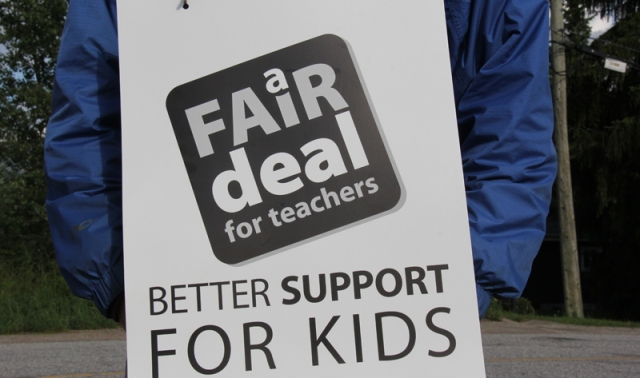Province reaches tentative agreement with BCTF
The BC Public School Employers’ Association (BCPSEA) and the BC Teachers’ Federation (BCTF) entered territory at times thought would be impossible to achieve after the two sides reached a tentative Memorandum of Agreement (MoA) negotiated pursuant to Letter of Understanding (LoU) No. 17 to the 2013-2019 BCPSEA-BCTF Provincial Collective Agreement Saturday.
The tentative agreement came less than four months after the BCTF won a landmark victory at the Supreme Court of Canada.
“The tentative agreement, if ratified, will allow the next school year to start with thousands more teachers, smaller class sizes, better class composition, and specialist-teacher ratios,” said BCTF President Glen Hansman in a media release on the teachers webside.
Hansman said BC teachers have been fighting for 15 years to defend our rights and to restore our working conditions.
“If ratified, this agreement will mean the beginning of a new chapter in public education in BC, one in which teachers will once again have the time to give students the individual care and attention they need and deserve,” he said.
“School libraries and counselling offices will be re-opened, shop and lab classes will have safety standards restored, and all classrooms will be properly supported.”
Hansman said the tentative agreement is still subject to a province-wide vote of BCTF members, as well as the BC Public School Employers’ Association’s process. BCTF members will vote March 8-10, 2017.
“This is great news for students, parents, and teachers,” said Mike Bernier, Minister of Education in a media release Saturday.
“If ratified, the agreement means thousands more teachers, more resources and more classroom supports.” Bernier added.
“If ratified, it will build on the $100 million for up to 1,100 new teachers announced in January’s interim agreement with the BCTF and the record funding increase we just announced in the budget.”
On Nov. 10, 2016, the Supreme Court of Canada issued its decision regarding the deletion of certain BCPSEA–BCTF Provincial Collective Agreement provisions by the Education Improvement Act. The Court’s decision restored the deleted provisions, which triggered the negotiation process under LoU No. 17, which states:
- “If the final judgment affects the content of the collective agreement by fully or partially restoring the 2002 language, the parties will reopen the collective agreement on this issue and the parties will bargain from the restored language. The Education Fund provisions will continue in effect until there is agreement regarding implementation and/or changes to the restored language.”
Bernier said given the Court’s restoration of nearly 1,400 clauses across 60 collective agreements, it was important for the parties to determine how to implement the restored language within the context of an education system that had evolved over the past 15 years.
The tentative MoA provides clarity related to class size and composition, non-enrolling staff and process language that are now restored.
“I want to congratulate the parties and thank them for the significant effort and professionalism that was brought to the table,” Bernier said.
“The parties had to deal with some very complex issues, it involved a lot of work, and everyone remained focused on problem-solving. We hope to build on this constructive approach and relationship in the years ahead.”
Hansman said the BCTF Executive Committee has endorsed the tentative agreement and is recommending ratification to the members.
In January, the government agreed to fund 1,100 new full-time teaching positions for the current school year. Many of those positions are now filled and those teachers are already supporting students.
“Now, which this tentative agreement achieves, teachers will see full restoration of our working conditions,” Hansman said.
“If ratified, schools right across BC will see smaller classes, more specialists like counsellors, special education teachers, and learning assistance teachers, and more support for children with special needs.”
“Student outcomes have improved dramatically over the past 15 years and are among the best in the world,” Bernier said.
“We already have a world-leading education system. With this agreement, we can expect even greater results for our students in the years ahead.”






















